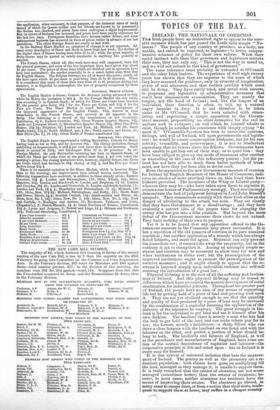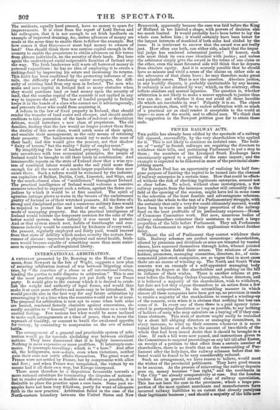TOPICS OF THE DAY.
IRELAND : THE RATIONALE OF COERCION.
TEis Irish people have an undoubted right to oppose to the coer- cive measure which has just passed the Lords their simple " No- lumus." The people of any country or province, as a body, are unable, and cannot be expected, to legislate—to devise compre- hensive schemes of policy for their own reform. When their social instinct tells them that governors and legislators mistake their case, they can only say, This is not the way to mend us, and we will not submit to this kind of government.'
The same tolerance must probably be extended to O'Connell and the other Irish leaders. The experience of well nigh twenty years has shown that they are superior to the mass of which they have assumed the guidance, only in vivacity of imagination, power of oral utterance, and that restless activity which must still be doing. They have rarely tried, and never with success, to propound any legislative or administrative measures that could bear dispassionate examination. They are merely the tongue, not the head of Ireland ; and, like the tongue of an individual, their function is often to talk up a natural angry impulse to fury. It is not therefore to be taken amiss in Mr. O'Connell, that he rests satisfied with stimu- lating and organizing, a simple opposition to the Govern- ment measure, propounding no other corrective for the evil its authors seek to extirpate' an evil which he himself admits to exist, though he satisfies his conscience with simply crying "fie upon it." O'Connell's function has been to make the opinions, feelings, and will of Ireland, tell upon governments and legisla- tors : lie would be a mere commonplace Irishman, but for his rare activity, versatility, and perseverance ; it is not in intellectual supremacy that he towers above his fellows. Governments have been unable to get him out of their way, or to quiet him : they have been obliged to give up one mode of treatment after another as unavailing in the case of this refractory patient : but the pa- tient has not been able to teach them better methods of treat- ment, nor have they yet been able to devise such.
Even the opposition to the new Government measure of coercion for Ireland by English Members of the House of Commons, indi- cates no clearer or more practical views on this head than have hitherto prevailed. The members of the Whig or Liberal party— whoever they may be—who have taken upon them to organize it, evince some notion of Parliamentary strategy. They convincingly demonstrate the lack of judgment betrayed in Lord John Russell s escapade. They remonstrate sensibly with their Irish allies on the danger of advancing to the attack too soon. They see clearly that they have Government at a disadvantage ; and they have evidently a correct idea of the proper time for charging the enemy who has got into a false position. But beyond the mere defeat of the Government measure their views do not extend. They have nothing of their own to propose. Yet it is to be hoped that any opposition offered to the Go- vernment measure in the Commons may prove successful. It is but a repetition of the old panacea of coercion in its pure unmixed condition ; but another application of a remedy which has always failed hitherto, and must fail again. Restraint can only prevent the immediate act ; it cannot take away the propensity, but on the contrary is apt to strengthen it. Among an untaught people re- straint and coercion may be necessary to allow time for new and wiser institutions to strike root ; but the promulgation of the improved institutions ought to precede the promulgation of the coercive measures ; and it ought clearly to appear that the re- straint is imposed simply upon individual violence and self-will resisting the introduction of a good law.
Physical ill-being is at the root of all the suffering and lawless- ness of Ireland. And this physical ill-being may be traced to influences which have prevented the natural development of social combination for industrial pursuits. Throughout the greater part of Ireland, the people have no idea of any means of supporting life but by getting hold of a piece of land and growing food upon it. They are not yet civilized enough to see that the quantity and quality of food produced by a piece of land may be increased by the combination of a capitalist directing the application of the industry of the labourers he employs. The great struggle in Ire- land is for the individual to get land and use it himself after his own fashion. The landlord there is merely a man who has had the luck to get hold of the land and can make others pay for its use ; the farmer, merely a middleman—a sharp fellow who can drive a close bargain with the landlord on one hand and with the labourer on the other, and pocket a portion of what should be- long to both. The landlords and farmers of England, as well as the merchants and manufacturers of England, have some no- tion of the mutual dependence of capitalist and labourer—the cooperativeprinciple is felt and acted upon : but in Ireland it is every man for himself.
It is this system of universal isolation that bars the improve- ment of Ireland. The gentry as well as the peasantry are a re- dundant population : both classes have gone on multiplying till the land, managed as they manage it, is unable to support them. It is truly remarked that the estates of absentees are not worse managed (sometimes better) than the estates of residents ; be- cause, in most cases, neither absentees nor residents have the means of improving their estates. The absentees go abroad, in
many cases to escape duns, or from a notion that their rents, inade- quate to support them at home, may suffice in a cheaper country The residents, equally hard pressed, have no money to spare for improvements. It is clear from the report of Lord Devon and his colleagues, that it is not enough to set Irish landlords an example of improved draining, &c., unless advances of money are made at the same time to enable them to follow the example. But how comes it that Government must lend money to owners of land? One should think there was surplus capital enough in the country to enable the proprietors to obtain advances on fair terms from private individuals, on the security of their lands. But here again the undeveloped social cooperative faculties of Ireland stop the way. The Irish landowner will waste all borrowed money in personal expenditure : he has no idea of employing it to create a sinking-fund by improving his estate and increasing its returns. Ws habit has been confirmed by the protecting influence of en- tails, the difficulty of foreclosing under mortgages, the diffi- culty of evicting land from any man in Ireland. The men who make and save capital in Ireland find so many obstacles when they would purchase land or lend money upon the security of land, that the surplus capital of the country is not applied in any way to improve the soil. The law of landed property in Ireland keeps it in the hands of a class who cannot use it advantageously, and prevents those who could from acquiring it. A reform in the law of fixed property in Ireland, that should render the transfer of land easier and cheaper, and should enable creditors to take possession of the lands of indolent or fraudulent debtors, would introduce a new class of proprietors. The old families, finding that the law would no longer protect them from the rivalry of this new class, would catch some of their spirit, and emulate their management, as the only means of retaining their property. The landowners would try to make the most of their land; • and this would give the peasant, not that shadow
fixity of tenure," but the reality. " fixity of employment."
By simplifying the law of landed property, and bringing it into accordance with true economical principles, the people of Ireland would be brought to till their lands in combination. And innumerable reports on the state of Ireland show that a wise sys- tem of combined labour would make the soil yield more than enough for all the wants of a much larger population than now exists there. Such a reform would be welcomed by the industri- ous capitalists of Belfast, Dublin, Cork, Limerick, and Sligo, and by the much-abused class of "middlemen" throughout Ireland. The practical intelligence of Ireland would welcome a coercive measure intended to support such a reform, against the fierce pre- judices by which it would be at first assailed. The spirit of agrarian outrage glows as warm in the breasts of the embarrassed gentry of Ireland as of their wretched peasants. All the force of a strong and disciplined police and a numerous military force would be required to protect the new lords of the soil, in their new mode of managing property. But the practical intelligence of Ireland would tolerate the temporary coercion for the sake of the better social system, whose infancy it was meant to protect. And as that system struck root, habits of forethought and con- tinuous industry would be contracted by Irishmen of every rank ; the peasant, regularly employed and fairly paid, would recover from that state of debility which makes scarcity the certain fore- runner of disease : improved in physical and moral health, Irish- men would become capable of something more than mere resist- ance to oppression—of self-regulated liberty.



























 Previous page
Previous page